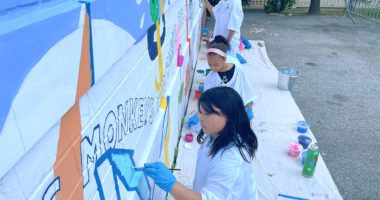Teaching is not a cookie-cutter task. It requires constant creativity, flexibility, and, like performing arts, the show must go on no matter what the circumstances may be on a particular day. That is what I noticed in my second TATIP observation with Katie Rainey’s writing class at The Young Women’s Leadership School in Jamaica, Queens.
Katie wasn’t feeling well, and she was right up front with the students about that fact.
“Sorry,” she said, “I have bronchitis, I’m taking antibiotics, and I don’t feel so great. But I’m here!”
I thought that Katie being honest with the students that she didn’t feel well was an excellent choice. The girls would have sensed it anyhow. Talking about it both gave the class a sense of empathy with Katie, and “humanized” her a bit, since most everyone could relate to the way she felt.
As usual, the class began with a free write. Katie told the girls they could write about anything they wanted, but to choose a color and emphasize that color in their writing. When time was up, students were eager to share.
Some of the students had written about a specific color itself. One had chosen red, and shared a moving piece describing blood and violence and victims. Another student was celebrating her fifteenth birthday. She wrote about how anxious she was to get her driver’s license, and described in great detail the black SUV that she wished for the moment the license was in her hand.
Katie responded by saying that she remembered getting her driver’s license when she was fifteen. Some of the students questioned her about getting a license at that age. (The earliest a young person can get a driver’s license in New York is seventeen.) Katie said:
“I grew up in Arkansas, and they had something there called a hardship license. My parents worked all the time. They needed me to drive myself to school, so I qualified for that license.”
The students were noticeably impressed. There was a rumble of “Wow! How lucky! You could do anything you wanted!” through the classroom.
“No, no,” Katie replied. “It wasn’t like that. I couldn’t go anywhere but school.”
She and her students got back to the business at hand.
I was impressed too, first because Katie sharing her experience of driving got the class so engaged, and turned the writing lesson into an opportunity for personal connection with her students. She struck a great balance with it, as well, becoming “one of the kids” for just a few moments, and then shifting roles again to get students back on task.
The second reason Katie’s sharing raised my antenna is that I am from Texas, and I remember having a student in Brooklyn who was amazed once when I mentioned that we were not allowed to go off campus for lunch in high school.
“But there wasn’t any place to go out to lunch where you lived,” he said.
I’m from Houston. “Doug, I grew up in a big city. There were lots of places we could go to eat.”
He shook his head. “When I picture Texas, I just see ranches and wide-open spaces.”
Doug learned something that day neither one of us had counted on, just like Katie’s students did. And that’s an important aspect of our roles as Teaching Artists that I had never considered. Many of us are from different states, or different countries, or different ethnic or socioeconomic backgrounds from the students we teach. Each time we make a personal connection by sharing our stories, we broaden their horizons just a little bit. Hopefully, we spark their curiosity enough to make them continue exploring the world they have not yet seen. And, by sharing their stories, our students do the same for us.
Teaching is not an assembly line job. No automatic pilot allowed. We have to be 100% present, quick thinkers, and ready for anything. The method that works for one student may not work for another. One class may need an entirely different approach than the next one. It’s a continual challenge, but when we see our students grow and flourish, the rewards are totally worth the effort. In a world that often lacks a human touch, thank goodness that teaching is still personal.
-Carolyn Clark, Writer, TATIP Trainee



